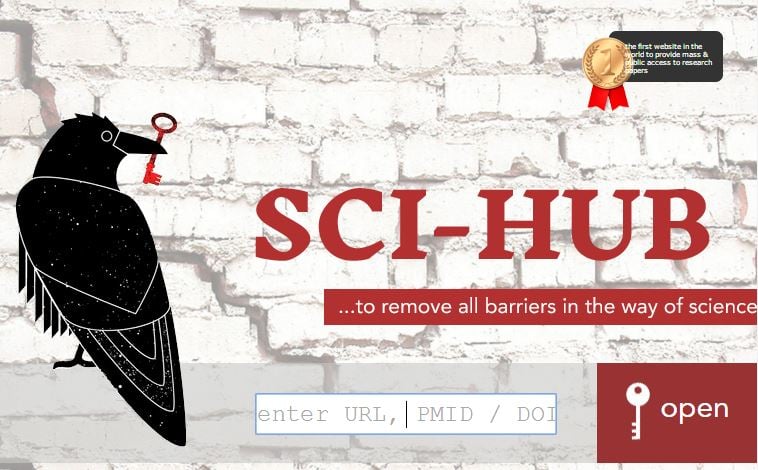During my studies, I was always frustrated by the pay-walls standing between my assignments and the references I needed to access. Alexandra Elbakyan is trying to solve this problem. This 27-year-old woman had the skills (and guts) to create SciHub, the ‘Napster of scientific publication’.
The scientific publication industry is generating $10Bn annual revenues, has margins around 30% and is controlled by big companies such as Elsevier, Thomson Reuters or Springer Nature. These revenues comes from university libraries and scientists’ grants, whose budget largely come from public funding (i.e. the average taxpayer) or philanthropy (like the Gates Foundation).
Unlike most other content-based businesses, scientific publishing transitioned to the digital era mostly unscathed – the Financial Times even called it ‘the business the Internet could not kill‘.
At least, before SciHub…
Alexandra Elbakyan, a 27-year-old researcher from Kazakhstan, started out with the same issues. While she was studying ‘Neuroscience and Consciousness’ in labs at Georgia Tech (US) and University of Freiburg (Germany), she was forced to pirate papers for herself and other researchers.
She then became involved withonline forums for scientists dedicated to getting around paywalls. After manually sending hundreds of papers that she retrieved by request, she decided to automate the process. Et voilá, SciHub was born.

SciHub can now get almost any paper, to anyone, in a matter of seconds. The site is estimated to have 50 million research papers in its database, and daily automated retrievals are in the order of tens of thousands.
Though details are undisclosed, SciHub operates by downloading content from university proxies (similar to the services that will allow people to connect to US’ Netflix, for example).
On its own, SciHub is quite the technical feat. But the gatekeepers of pay-walls are not amused…
Elsevier, the largest for-profit scientific publisher, sued Elbakyan in New York federal court for copyright infringement and computer fraud. The young Kazakh answered by claiming that ‘Elsevier operates by racket‘. Her domain Sci-Hub.org was blocked, but she just re-launched with another domain.
Do scientific publishers deserve SciHub?
Elbakyan and SciHub are being hailed as the ‘Napster moment’ of science journals, but the parallel with music piracy is not that straightforward – especially regarding the perceived fairness of copyright.
Scientific publishers may be a content business in its daily operations (reviewing, editing, distributing). However, there is a core difference in its cost structure – it does not pay its content producers.
In fact, scientists pay to publish their work. And the sums may seem scandalous for someone outside academia, in the orders of thousands of euros. When my Master’s thesis supervisors were discussing publishing a paper, I learned that just one additional image (that we would make and would sit behind a screen) would cost €200! The peer-reviewing of articles is also made for free by other scientists.
So publishers with pay-walls basically earn money on the content producers as well as on the content readers – what an ideal business model! These companies have fixed costs (editing, marketing, sales…) but with the internet they actually decreased – seeing as hosting websites is cheaper than printing millions of magazine copies.
This leads to one of the main accusations against for-profit scientific publishing: these companies make TOO much money, with 30% margin from a $10Bn industry. And a big part comes from public money (so the regular taxpayer).

Is there a right to keep science behind a pay-wall?
Holding scientific knowledge hostage raises many ethical problems. Science is about building upon previous knowledge – Newton famously said that ‘If I have seen further it is by standing on the shoulders of giants‘. In strict terms, a scientist would have the duty to review every paper published in the past relevant to his work, whether behind a pay-wall or not.
These creates an equality problem between researchers in different part of the world (but even the world’s wealthiest universities are having enough of Elsevier’s prices). It also blocks independent science. In fact, most science-based startups and citizen scientists (like biohackers) must keep ties with academia to legally access all the papers they need.
And the public is effectively left out from engaging with science, including medical research that could help their health decisions.

The Open Access movement addressed this issue by cutting the revenue from readers and focusing on authors. It has gained a lot of traction since its early days, and most articles produced by the best in trendy fields like systems biology can be accessed freely.
But as Internet legend Aaron Swartz would highlight in his manifest, Open Access does not solve the problem of everything that has been published before, which includes structural science research. Keeping them unavailable could propagate incorrect conclusions which are taken for granted – like the now ‘debunked’ microbiome ratio.
The SciHub founder will now give interviews and show her face, in a very Edward Snowden style, to explain the problem and give her motivations. But unlike Swartz, who never released his library of massive downloads, she remains practical. Elbakyan lives in Russia and doesn’t seem to have plans to appear in front of an US Court.
Good luck to her, she will need it.





